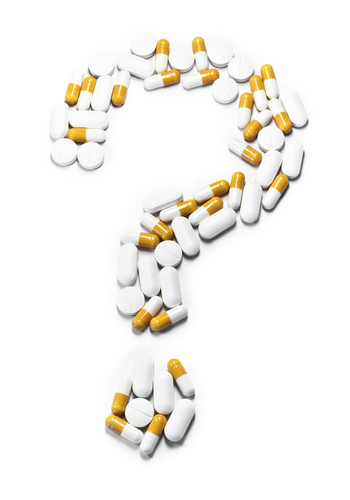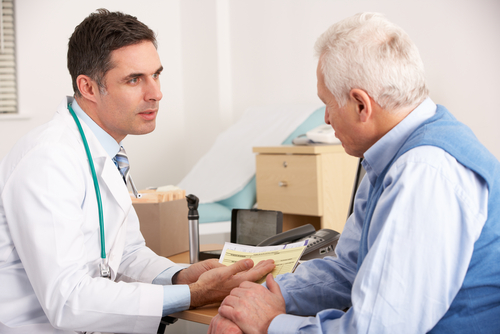Contents - Choosing the right course of action
Making rational decisions about your health

We all develop new health problems sometimes. Often, problems such as a mild back pain or a headache are familiar to us and are not especially troublesome. But what if the back pain doesn’t settle? What if the headache gets worse rather than better? And what if you develop other additional symptoms such as sweating or a fever? At some stage you’re likely to start worrying and wonder what to do next. Should you not do anything? Take some pain killers? See your pharmacist? Consult your GP? See a specialist or other health professional privately? Go to the nearest Accident and Emergency department – or, in the worst case, should you phone 999 for an ambulance?
To stay healthy and get the best available medical advice and treatment when you fall ill, you need to be able to make rational decisions about your health. Doing so can at times be tricky and even a bit scary. In many cases you’ll be able to make the right decision just by using common sense, but it’s easy to feel out of your depth.
This article aims to give you a better footing for deciding when you can deal with your health problems yourself, and when it’s best to seek medical advice. In the same way that you don’t have to be a software engineer to deal with simple computing problems yourself, you don’t have to be a doctor to be able to recognise some common or potentially serious health problems and know what to do about them.
Assessing your symptoms
Medical problems come in all shapes and sizes. Some are easy to recognise and straightforward, whereas others are complex and sometimes dangerous. Telling the difference can sometimes be tricky, and if in doubt, making a formal diagnosis is best left to the professionals. Here are some general features and characteristics of symptoms that may suggest that something more serious could be going on and that should prompt you to seek medical help:
Timing of the problem
Mapping out the timeline of your symptom can be useful, as is remembering your activities or other circumstances in the hours or days before the problem started. Treat any new symptom that comes on suddenly without any obvious reason with suspicion, particularly if it gets worse, is present all the time, and does not go by itself. For example, it’s best to seek medical advice for any new chest pain or a severe pain in your abdomen that you can’t explain and that doesn’t go away quickly.
Location and spread
The location of a symptom such as pain often gives away the underlying cause. For example, a new pain in the middle of your stomach that moves down and to the right is typical of appendicitis, whereas pain in the upper right hand corner of the abdomen that comes and goes in waves and is severe may suggest problems with your gall bladder, such as gall stones or an infection called cholecystitis. A sudden wave-like pain in the back and side of your body that makes you walk around rather than lie down could be due to a kidney stone (this is called ureteric colic). A sudden pain or tightness in the centre of your chest, particularly if it spreads to other areas like your neck and jaw, your left arm, or your back may suggest underlying heart problems such as angina or a heart attack. Seek medical advice for any new symptoms affecting your chest, back, abdomen or head that you’re not sure about.
Impact on your life
Health problems can affect people in different ways. For example, ongoing pain and stiffness in the little finger may not affect a professional football player, but a concert pianist would want to get a medical opinion for this problem sooner rather than later. Seeking medical help for any problem that considerably affects your quality of life is entirely appropriate.
Presence of ‘warning’ symptoms and signs – the red flags
Many symptoms don’t appear in isolation but are accompanied by other symptoms. These additional symptoms may sometimes suggest that something more serious may be going on. For instance, sudden speech problems together with loss of vision and weakness in one of the limbs suggest the possibility of a stroke, which is a medical emergency. Examples of other important warning symptoms and signs (medical practitioners call these red flags) are:[1]
- Constant, and gradually worsening pain – or sudden and very severe pain.
- Loss of appetite over weeks and months for no apparent reason.
- Lumps or bumps anywhere on your body that are new and persistent (that is, lasting for more than two or three weeks) and that you can’t explain.
- Unusual sweating (particularly at night).
- Unexplained fever.
- Unintentional and unexplained weight loss.
Although these symptoms don’t necessarily mean that something serious is going on, it’s best to act on them and get advice from your GP urgently.
Past medical problems
If you’ve had any significant illnesses, operations or accidents in the past, consider whether these may be connected with your new symptom. For example, a previous bone fracture that involved one of your joints can potentially lead to arthritis later on, often causing gradually worsening joint pain with or without swelling. Likewise, if you have previously been diagnosed with cancer, new and unexplained symptoms could potentially be due to a recurrence and need further assessment by your doctor. Seek medical help to find out what’s going on if you’re not sure.
Underlying conditions
If you suffer from underlying medical conditions, these may sometimes give rise to new health problems. For instance, if you have a diagnosis of diabetes, you’re more likely to develop infections or cardiovascular disease, mainly caused through furring up/hardening of your arteries. Headaches are more common if you suffer from underlying stress or depression. If you develop symptoms on top of ongoing medical problems, seek further advice from a health professional.
Medication
Drugs form an important part of modern medicine, but many of them can cause side effects. So if you take medicines regularly or have just started taking a new drug, there’s a chance that these may be causing new symptoms.[2] Here are just a few examples:
Antidepressants such as selective serotonin reuptake inhibitors (SSRIs) can give you a number of side effects, particularly when you first start taking them.[3] Common symptoms include light-headedness, feeling ‘spaced out’, headaches, abdominal discomfort, diarrhoea, or problems with sleeping. Usually these symptoms settle within a week or two and are nothing to worry about, so if you’re prescribed antidepressants it’s usually worth persevering unless your problems are very severe or last for longer than you expect.
Aspirin-type medicines (also called non-steroidal anti-inflammatory drugs, or NSAIDs) may cause stomach problems, so it’s best to take them with food.
Blood pressure lowering medication (or antihypertensives) may lead to tiredness, loss of sex drive and other problems.
If you think your medical problem could be due to medication, check the patient information leaflet that comes with the medication. If you’re concerned and your problem doesn’t settle by itself, speak to your pharmacist or GP for further advice on what to do next.
Lifestyle factors

Smoking, drinking alcohol, lack of exercise and an unhealthy diet are often to blame for new health symptoms. Here’s a selection of common medical problems that may result from lifestyle factors and should trigger seeking professional help:
Drinking too much alcohol can cause a variety of symptoms. Among the most common ones are mental health problems such as feeling low and depressed, being more anxious and having problems with sleep. If you regularly drinking more than the recommended limits of alcohol (see www.drinkaware.co.uk for current recommendations), this increases your risk of developing cardiovascular disease, a major cause of heart attacks and strokes. If you’re a heavy drinker, abdominal pain, tiredness and a yellow tinge in your skin and eyes (known as jaundice) may suggest that your liver is damaged (called alcoholic liver disease).
Smoking can lead to serious health problems such as cancer and cardiovascular disease. See your GP if you suffer from persistent cough or get chest pains, or if you develop any other symptoms that persist for more than a couple of weeks and don’t improve. Intermittent pain in one or both of your legs on walking that disappears when you rest (known as intermittent claudication) can be due to clogged-up blood vessels. If you’re a man, smoking may directly affect your fertility. Smoking increases your risk of developing bladder cancer, and so blood in your urine for example is an important warning sign.
Poor diet and lack of exercise may be responsible for shortness of breath due to lack of fitness, obesity and bone problems (for example knee and back pain).
Checking for physical clues
Being able to examine your body in a basic way is an important skill that can help with deciding whether you need to seek medical advice.
Look for signs of illness by carefully inspecting the affected body part. Any bleeding or deformity is likely to require further medical assessment unless you’re confident that the underlying cause is not serious. Swelling, redness and pain on touching suggest infection or inflammation. Any new unusual skin lesion (particularly if it’s dark, gets bigger, bleeds, itches, or has an irregular border) needs further assessment by a medical professional.
Feel for any unusual lumps or bumps. Be wary of any lumps appearing in your neck or other places for no apparent reason. Although most lumps are harmless, seek a medical opinion if they’re getting bigger, last for two weeks or more, of if they’re accompanied by any of the ‘red flag’ symptoms mentioned earlier. Breast lumps in women are common and in most cases are not due to breast cancer. However, see your GP for any new lump that persists until after the next period. If you’re a man, see your GP if you notice a new lump on one of your testicles to rule out testicular cancer.

In summary, seek medical advice if:
- You’re seriously worried about your health.
- You’re more unwell than you think is normal.
- You’re not sure what to do next.
- Your quality of life is considerably affected.
- You decide that you can’t deal with a health problem yourself.
Many different professions form part of the wider health community, and there are many services to choose from, both within the NHS and the private sector. To help you choose the most appropriate strategy for dealing with your health problem you can find out more at the NHS Choices website.
References
1. Schroeder K, Chan W-S, Fahey T. Recognizing red flags in general practice. InnovAiT. 2011 Feb 11;4:171–6.
2. Committee JF. British National Formulary (BNF) 62. 62nd ed. Pharmaceutical Press; 2011. 1072.
3. Hu XH, Bull SA, Hunkeler EM, Ming E, Lee JY, Fireman B, et al. Incidence and duration of side effects and those rated as bothersome with selective serotonin reuptake inhibitor treatment for depression: patient report versus physician estimate. J Clin Psychiatry. 2004 Jul;65(7):959–65.
Non-steroidal anti-inflammatory drugs. A group of drugs that provide pain relief and reduce inflammation.
Full medical glossary


